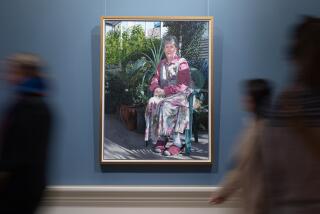The Rev. Andrew M. Greeley dies at 85; outspoken Catholic priest
A self-described “loud-mouthed Irish priest” (“And may they carve it on my gravestone!” he once quipped), the Rev. Andrew M. Greeley rejected a conventional definition of his vocation.
Denied a parish, the Roman Catholic priest created his own pulpits as a sociologist whose groundbreaking research corrected misimpressions of American Roman Catholics and as a bestselling novelist whose works — “The Cardinal Sins,” “Thy Brother’s Wife” and more than 50 other titles — made readers blush and church superiors fume.
An irrepressible critic of church policies on birth control, divorce and the ordination of women, he once tarred American bishops as “mitered pinheads.” Decades before the priest sex abuse scandal received broad attention, he was “one of the first — inside or outside the church” to publicly challenge the U.S. hierarchy’s mishandling of the problem, said David Clohessy, director of the leading national advocacy group Survivors Network of those Abused by Priests.
Greeley, 85, who once described himself as “a priest who happens to do these other things as a way of being a priest,” died in his sleep early Thursday at his Chicago home, said his niece, Laura Durkin.
His fictional treatment of the everyday dilemmas of Catholics won millions of loyal readers in the U.S. and abroad, many of whom said his stories of sin, grace and salvation brought them closer to the church. But provocative plot twists — including pedophile priests, corrupt cardinals and explicit sex — made others, particularly in the church hierarchy, yearn for a vow of silence from the gadfly in their midst.
“There is a certain truth-telling that goes on in his novels that mirrors the kind of truth-telling he has brought to the church as a social scientist. ... He made us face real facts,” Thomas W. Roberts, former editor of the independent National Catholic Reporter newspaper, told The Times a few years ago.
Greeley completed his final book — a study of Chicago-area Catholics published in 2010 — just weeks before he fractured his skull in a 2008 fall caused when his jacket got stuck in a taxi as it pulled away. He never fully recovered from the traumatic injury to his brain.
Born Feb. 5, 1928, in Oak Park, Ill., Greeley knew he wanted to be a priest by the time he was in second grade. After attending a seminary high school, he continued his formal training at Saint Mary of the Lake Seminary in Mundelein, Ill.
Ordained in 1954, he was assigned as an assistant pastor to an affluent suburban Chicago parish, where he worked with the youth. To help him better understand the young parishioners in his charge, he began to read sociology books, particularly the work of David Riesman, who wrote the 1950 classic “The Lonely Crowd.” A University of Chicago professor encouraged Greeley to keep notes on his experiences, which led to the first of more than 100 nonfiction books, “The Church in the Suburbs” (1958).
Convinced that he wanted to serve his church as a sociologist, he enrolled at the University of Chicago with the blessing of his archbishop. His timing was auspicious, with John F. Kennedy, a Roman Catholic, running for president and the Second Vatican Council convening the first of several historic sessions that would bring important reforms. He earned a master’s in 1961 and a doctorate in 1962 with a study on the effect of religion on the career paths of 1961 college graduates. His scholarship led to his longtime position as a senior researcher on the staff of the university’s National Opinion Research Center, which surveys the American public on religion and other issues.
His early work at the center examined the widespread belief that Catholics had low college attendance rates. Greeley found that white Catholics graduated from college and pursued advanced degrees at higher rates than other whites. He said the reason was the quality education that they had received in parochial schools.
The superiority of Catholic school education “is so widely accepted now that it is hard to grasp how new and controversial that idea was then,” said Michael Hout, a UC Berkeley sociology professor and Greeley co-author. He said Greeley’s early work in such books as “The Social Effects of Catholic Education” (1961), “The Education of Catholic Americans” (1966) and “American Catholics: A Social Portrait” (1977) were “path-breaking in their scope and stereotype-breaking in their findings.”
During the 1970s, Greeley studied ethnic Catholics and showed how religion influenced their political behavior. Greeley, who also taught at the University of Arizona, was one of the first scholars to point out the growing schism between the Catholic hierarchy and the laity in the wake of Humanae Vitae, the controversial Vatican encyclical from Pope Paul VI that banned artificial birth control.
Greeley’s studies made him suspect in the eyes of fellow priests and particularly Chicago Archbishop John Cody, who began a controversial tenure in 1965. Cody opposed Greeley’s sociological work and denied him a parish; Greeley returned the disdain, calling the cardinal a “madcap tyrant” after the high-ranking prelate closed a number of inner-city schools. Although marginalized, Greeley stayed in the church and continued to conduct research .
In 1972 he completed a two-year study that found widespread dissatisfaction among American priests. American bishops had helped fund the research but rejected its findings. “Honesty compels me to say that I believe the present leadership in the church to be morally, intellectually and religiously bankrupt,” Greeley said.
He was denied tenure at the University of Chicago in 1973, even though he had taught there for a decade and published dozens of books. Greeley said anti-Catholic prejudice was the reason, but a colleague was quoted in news reports saying that the denial was due more to the sociologist-priest’s cantankerous nature. (Greeley eventually received a professorship, in 1991.)
Greeley found freedom in his alienation: He began to write novels, an enterprise that melded his various identities.
“I am confident that I have never done anything more priestly in my life than write those novels,” he said in a 1990 biographical essay.
His first two novels — “The Magic Cup” (1975) and “Death in April” (1980) — attracted little attention. But his third attempt was an overwhelming success.
“The Cardinal Sins” (1981) follows two priests: one a writer-sociologist like the author, the other a cardinal with a penchant for rough sex. Church officials accused Greeley of using the latter character to malign Cardinal Cody, who at the time the book was published was embroiled in a scandal involving hundreds of thousands of dollars allegedly paid to a mistress. Cody was never formally charged with a crime and died of a heart attack in 1982 at the age of 74.
Greeley denied that Cody had inspired the character, telling the New York Times that his fictional creation was “a much better bishop than Cody and a much better human being.” The novel spent several months on bestseller lists despite the dim views of critics, such as Time magazine, which noted that “The Cardinal Sins” was “about as good a novel as it is a pun.”
The worst that another critic could say about Greeley was that he had become a “wealthy celebrity” who traded on his position as a man of the cloth. “Without his Roman collar,” Victor Power wrote in the Chicago Tribune in 1986, “his novels wouldn’t have been novelties.”
Those novels enabled the author to buy three homes — one in Chicago, another in Tucson and a third at Grand Beach, Mich. He also used his wealth to fund his sociological research and give away millions of dollars to charity.
He donated $1 million to the University of Chicago to endow a chair in Catholic studies in 1984. Two years later, he tried to donate $1 million to support inner-city schools in the Chicago archdiocese, but then-Cardinal Joseph Bernardin turned the money down. Undaunted, Greeley gave the funds to a private foundation created to support the schools.
He continued to turn out dozens of steamy potboilers (“Ascent Into Hell,” “Fall from Grace,” “The Priestly Sins”), mysteries, even science fiction, often producing two or three novels a year until 2007, when the final installments in his “Father ‘Blackie’ Ryan” and “Nuala McGrail” series were published.
Glistening loins, unfettered breasts and rapes were so abundant in his fiction that the National Catholic Register said the author had “the dirtiest mind ever ordained.” Others wondered how a celibate priest knew so much.
Maintaining that “there is nothing wrong with sex,” Greeley ignored calls to tone down his material and insisted that “a priest would not ‘know’ about sex only if he were not human.”
He argued that priests are probably more knowledgeable about marriage than most married men because of what women tell them in confession. He felt confident enough about his knowledge to write a marital advice book, “Sexual Intimacy” (1988), which encouraged creative sex play within the bounds of marriage. Its most-quoted line advised wives to greet their husbands “wearing only panties and a martini pitcher — or maybe only the martini pitcher.”
A.W. Richard Sipe, a former monk and priest, once wrote that Greeley’s novels “gave his readers permission to think about sexuality — even priests’ sexuality — and about the authoritarian structure of his church outside the boundaries of the official moral teachings.”
For Greeley, the objective was to use fiction as “a brilliant way of passing on religion.” Viewing human sexuality as a sacrament, “a metaphor for God’s love for us,” he said the main idea of “Cardinal Sins” was God’s love pursuing the protagonists through their human loves, which are “sometimes licit, sometimes not, always with a sexual component, but never with a compulsion to sin.”
He would argue that his fervid imagination was Catholic through and through.
Catholics, he said, perceive God’s love in all things, while Protestants are more inclined to emphasize God’s absence. His studies of Catholic imagery led him to declare that Catholics’ tendency to see God as “a lover, a spouse, a friend and mother” made them more liberal in their political views than those who regard the Deity as “king, lord and master.”
“The imagination is religious. Religion is imaginative,” he wrote in a 1988 essay in the national Catholic weekly America, in which he analyzed the Catholic symbolism in songs by Bruce Springsteen. The bestselling Springsteen album “Tunnel of Love,” Greeley wrote, “may be a more important Catholic event in this country than the visit of Pope John Paul!”
Greeley is survived by a sister, Mary Jule Durkin, five nieces and two nephews.
More to Read
Start your day right
Sign up for Essential California for the L.A. Times biggest news, features and recommendations in your inbox six days a week.
You may occasionally receive promotional content from the Los Angeles Times.







